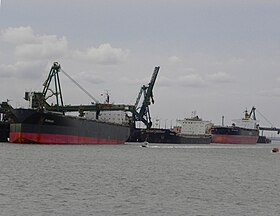Port of Gladstone
| Port of Gladstone | |
|---|---|
 Cargo ships in Gladstone Harbour, 2010 | |
 Click on the map for a fullscreen view | |
| Location | |
| Country | Australia |
| Location | Gladstone |
| Coordinates | 23°49′12.70″S 151°14′33.08″E / 23.8201944°S 151.2425222°E |
| UN/LOCODE | AUGLT[1] |
| Details | |
| Opened | 1914 |
| Owned by | Gladstone Ports Corporation |
| Type of harbour | Natural |
| No. of berths | 24[2] |
| Draft depth | 18.8 m.[2] |
| Statistics | |
| Annual cargo tonnage | 76,400,000 tonnes (2010–11) |
| Website www | |
The Port of Gladstone is
Major exports include coal, alumina, aluminium, cement products and liquid ammonia. Coal makes up 70% of the total exports from the port.[5] Each year 50 million tonnes of coal passes through the port. Major imports include bauxite and petroleum products as well as general cargo in containers.
In 2008, the Queensland Government announced A$20.9 million worth of funding for the port which included A$4.3 million for
In late 2010 and early 2011 the port was closed in the aftermath of the 2010–2011 Queensland floods. The closure of the Blackwater railway system halted deliveries of coal from the Bowen Basin.[7]
Facilities

The port consists of a number of wharves and terminal facilities. Auckland Point was where coal exporting began in 1925 and later live horse exports occurred in the mid-1930s.[8] Barney Point was used to export coal from Moura. The facilities here were incorporated into the Port of Gladstone in November 1998.[8]
The first
All shipping to and from the port is through
Expansion
The western part of the harbour basin is currently being expanded, primarily to allow increased exports of
At least 25 million cubic metres of sediment is expected to be dredged.[11] Dredging began in June 2011 and is expected to be completed in 2014.[12] The Port of Gladstone has permission to dredge 32 million tonnes.[13] Two water quality monitoring sites in the basin have repeatedly recorded levels of turbidity above acceptable levels.[13] High turbidity levels pose a threat to seagrass beds in the area.
In August 2011, a Fisheries Queensland spokesman said they received reports of fish with milky eyes.[11] A spokesman from the Gladstone Fish Markets claimed that diseased fish were still being caught in large numbers in November 2011.[14]
In June 2012, the UNESCO World Heritage Committee requested that an independent review into the management of the port be undertaken.[15] The review found that the port was being properly managed and that the sediment contained acceptable levels of contaminants.[16] The four-person expert panel blamed severe weather for recent fish deaths.[16]
See also
References
- UNECE. Retrieved 8 October 2020.
- ^ a b "Port of Gladstone, Australia". www.findaport.com. Shipping Guides Ltd. Retrieved 8 October 2020.
- Gladstone Observer. APN News & Media. 3 December 2010. Retrieved 5 December 2010.
- ^ "Home". gpcl.com.au.
- ^ "Gladstone Ports Corporation: Trade Statistics". Port of Gladstone. Archived from the original on 1 December 2009. Retrieved 5 December 2010.
- Gladstone Observer. APN News & Media. 4 June 2008. Retrieved 5 December 2010.
- ^ David Fickling (14 January 2011). "Gladstone port to resume coal exports on Saturday". The Australian. Retrieved 31 May 2012.
- ^ a b c d e f "History of Gladstone Ports Corporation". Port of Gladstone. Archived from the original on 20 October 2011. Retrieved 5 December 2010.
- State of Queensland. Retrieved 27 March 2019.
- ^ "Australia's Santos begins construction of Curtis Island GLNG plant". Platts. The McGraw-Hill Companies. 27 May 2011. Retrieved 31 May 2012.
- ^ a b Brian Williams (17 September 2011). "Warning: Gladstone fish off the menu and central Qld coast closed to fishing". The Courier Mail. News Queensland. Retrieved 31 May 2012.
- ^ "JV Van Oord, Dredging International Australia Acquire Contract for Gladstone Western Basin Dredging". Dredging Today. 10 August 2011. Retrieved 31 May 2012.
- ^ a b Tony Moore (4 May 2012). "Changes muddy waters around dredging". Brisbane Times. Retrieved 31 May 2012.
- ^ Andree Withey, Francis Tapim and Paul Robinson (8 November 2011). "Government defends probe into Gladstone's sick fish". ABC News. Retrieved 31 May 2012.
- ^ "Independent review of the Port of Gladstone – Frequently asked questions". Commonwealth of Australia. Retrieved 28 October 2014.
- ^ a b "Reef port dredging ruled OK". The Australian. 12 August 2013. Retrieved 28 October 2014.
